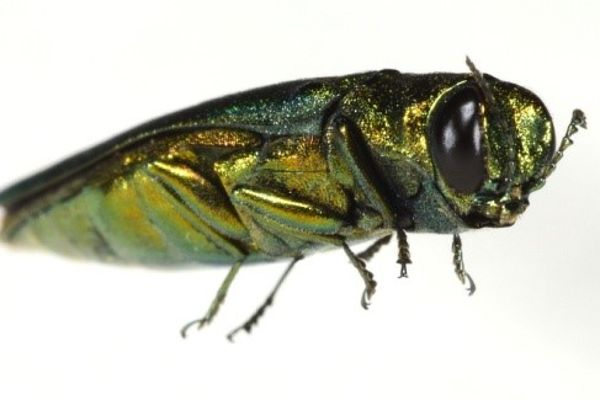Forest plant protection in Austria

Forest plant protection encompasses all measures to prevent the introduction and spread of harmful organisms on forest plants, plant products and especially on wood.
Forest plant protection
With the exception of the Vienna, Linz and Graz airports, Austria has no EU external border control posts. As wood consignments are not normally transported by aircraft, phytosanitary import checks of consignments addressed to Austrian companies are not carried out by the Austrian authority but by the competent plant protection authorities at the EU entry point.
The main focus in forest plant protection is therefore on the inspection of wood packaging material in the interior of the country at approved places of destination.
In case of intercepted consignments,
- via EUROPHYT (EU network) the Commission and all Member States,
- the plant protection service of the country of dispatch and
- EPPO
are informed by the Federal Ministry.
Every year, the Plant Protection Service of the Federal Forest Office, which is mainly based at the Institute for Forest Protection of the Federal Research and Training Centre for Forests, Natural Hazards and Landscape, carries out physical inspections of wood packaging material in around 700 containers.
Forest plant protection has a long tradition in Austria
In addition to the stringent provisions of the Forestry Act, the so-called Wood Inspection Act (“Holzkontrollgesetz”) was passed in 1962. This was necessary because in the early 1960s, large quantities of coniferous wood in bark were imported from the former USSR via the Black Sea and the Danube, and later also by rail.
All coniferous wood in bark that was imported at certain entry points was inspected at the border by wood inspection bodies and, in the event of pest infestation, was either treated under supervision or rejected.
Upon Austria’s accession to the European Union, the Wood Inspection Act was replaced by the Plant Protection Act 1995, Federal Law Gazette 532/1995.
Legal basis
Plant Protection Act 2018
The Plant Protection Act 2018 (“Pflanzenschutzgesetz 2018”) regulates the measures to protect against the movement of harmful organisms of plants and plant products (Federal Law Gazette I No 40/2018).
This Federal Act applies also to wood, wood products and all kinds of objects made of wood, and regulates above all
- the government authorities and the bodies of the Austrian plant protection service,
- the general bans of and restrictions to the movement of harmful organisms;
- the plant passport as well as
- the penalty provisions.
More provisions are included in the plant protection acts of the Provinces.
Plant Protection Ordinance 2019
The Plant Protection Ordinance includes detailed provisions concerning the plant passport and stipulates the fees for the activities of the authority (Federal Law Gazette II No 430/2019).
Wood Packaging Control Ordinance
Measures to protect against the introduction and the spread of pests through wood packaging material (WPM) were enacted until 30 June 2020 with the Austrian Wood Packaging Control Ordinance (“Verpackungsholz-Kontroll-Verordnung”).
From 1 July 2020, phytosanitary import controls of wood packaging material from high-risk countries have been carried out in accordance with Delegated Regulation (EU) 2019/2125.
In Delegated Regulation (EU) 2019/2125, the competent authorities (in Austria: Federal Forest Office) are required to perform, on the basis of a risk-based monitoring plan, inspections of commodities entering the Union in which wood packaging material regulated by the ISPM 15 standard is present, prior to customs clearance.
Until publication of a Commission implementing decision on minimum control frequencies for specified groups of commodities if they are accompanied by wood packaging material and originate from certain high-risk countries, for all EU Member States, Delegated Regulation (EU) 2019/2125 will be implemented in Austria in accordance with the regulation published in the official gazette of the Federal Forest Office.
The risk analysis based on the national and international notifications of complaints concerning shipments with non-compliant wood packaging material that were documented in the EUROPHYT notification system has shown that, for Austria, the following categories of commodities pose a particularly high risk for the introduction of invasive pests, if they originate from China and Belarus:
Major innovations since 1 July 2020:
- Reduction of the product groups: Remaining notifiable commodities with CN codes: 2514, 2515, 2516, 4401, 4415 10, 4415 20, 4418, 4421, 6501, 6801, 6802, 6803, 6907
- Standardised minimum control frequency: 15 percent
- Economic operators or their customs representatives must declare specific consignments subject to inspection to the Federal Forest Office in good time before the consignment arrives at the point of entry or at the place of destination. The national WPM reporting system must continue to be used by the registered declarants of regulated consignments. The officially signed release notices are still accepted by the customs authorities.